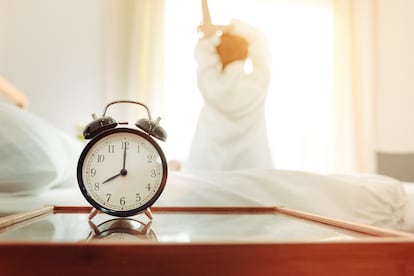Why do we often wake up just before the alarm goes off?
People who have a very regular sleep schedule know when to get up, even while sleeping

There are people who say that they have never had to use an alarm clock to wake up on time. The reasons for this are not entirely clear, but we do have some idea why this occurs. It’s believed to be connected to our internal clock. All of us have an internal clock. This internal clock sets our chronobiology, the body’s schedule: when to be awake and active and when we should be sleepy and go to sleep.
Our internal clock is fundamentally regulated by light. Information about whether there is natural light and how much light there is enters through our eyes and travels to our suprachiasmatic nucleus, which is the main center that regulates the so-called circadian rhythm in the brain. This tells the body whether it is time to sleep or time to be active. In addition to light, there are other stimuli that influence the internal clock, for example, meal times. If we have regular schedules, that information is very relevant to our internal clock. And also to the degree of activity that we have throughout the day.
With this information, this clock is synchronized and there comes a time when, if we also have a very regular sleep schedule of going to bed and getting up every day at the same time, we know when we have to wake up, even if we are sleeping. For people who lead a more or less regular schedule, the internal clock works, and that is why we wake up just before the alarm goes off.
This also happens that if we get used to waking up at the same time every day over a long period of time, for example, when we are working. When the weekend arrives, we wake up at the same time, even without an alarm. That’s because our brain has that information.
The factors that regulate our internal clock set in motion a series of hormones such as cortisol and melatonin. These hormones are the ones that regulate whether we are alert or sleepy. Another factor that must be taken into account is how sensitive a person is to light. There are people who are very sensitive to light and can wake up without an alarm, while others are much less sensitive, and never experience this.
There is another issue that also matters. Based on how the biological clock works, we can distinguish two types of people. Early sleepers, who are people who go to bed very early and, therefore, meet their sleep hours earlier and therefore wake up early, and people who suffer from delayed sleep phase disorder. For people in the latter group, the internal clock is delayed, meaning they go to sleep very late and, consequently, also wake up very late. It is very difficult for these types of people to wake up without an alarm because they will always have a lot of sleep pressure early in the morning, making it challenging to wake up. What happens to them is the opposite, the alarm goes off, and they turn it off over and over again.
In addition to these two types, there are another two profiles that relate to how many hours a person sleeps. There are people we call short sleepers who can be perfectly active during the day after only five hours of sleep, and there are others, who need to sleep more than the recommended eight hours. For the second group, it will be much more difficult to wake up without an alarm, while the first group is likely to be the first to wake up.
If a person follows a very regular sleep schedules, going to bed at 11 p.m. and getting up at 7 a.m. every day, during the night, this person will go through specific sleep cycles: first superficial sleep, then deep sleep, and then REM sleep. This will also unconsciously tell their brain that after three or four complete sleep cycles, it is time to get up. That’s why they wake up without an alarm.
Olga Mediano is a specialist in pulmonology, researching sleep at the University Hospital of Guadalajara.
Tu suscripción se está usando en otro dispositivo
¿Quieres añadir otro usuario a tu suscripción?
Si continúas leyendo en este dispositivo, no se podrá leer en el otro.
FlechaTu suscripción se está usando en otro dispositivo y solo puedes acceder a EL PAÍS desde un dispositivo a la vez.
Si quieres compartir tu cuenta, cambia tu suscripción a la modalidad Premium, así podrás añadir otro usuario. Cada uno accederá con su propia cuenta de email, lo que os permitirá personalizar vuestra experiencia en EL PAÍS.
¿Tienes una suscripción de empresa? Accede aquí para contratar más cuentas.
En el caso de no saber quién está usando tu cuenta, te recomendamos cambiar tu contraseña aquí.
Si decides continuar compartiendo tu cuenta, este mensaje se mostrará en tu dispositivo y en el de la otra persona que está usando tu cuenta de forma indefinida, afectando a tu experiencia de lectura. Puedes consultar aquí los términos y condiciones de la suscripción digital.








































